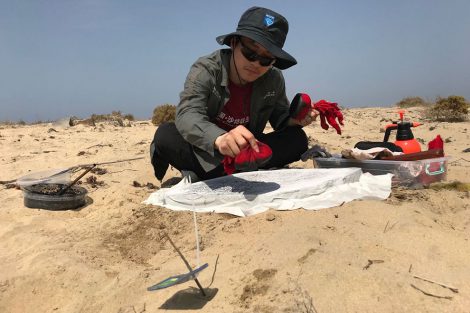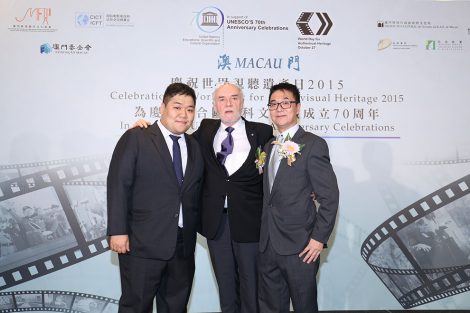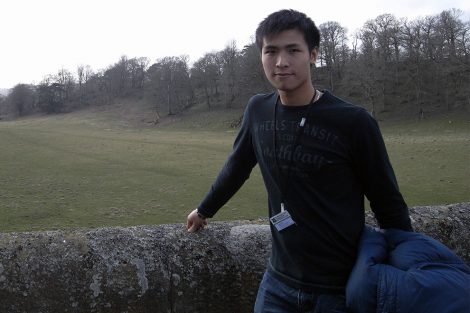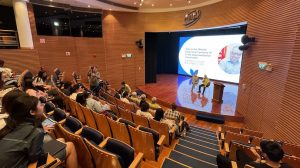The IFT bachelor degree programme in Heritage Management opens up a wide range of opportunities for careers in the field, according to 3 alumni who graduated in 2010. They say the type of work available to graduates ranges from jobs in museums or with other organisations that protect heritage, to less obvious options such as underwater archaeology.
The Heritage Management programme began in the 2005/06 academic year and was the first 4-year undergraduate programme in heritage management anywhere in the Asia-Pacific region. The course began just as the United Nations Educational, Scientific and Cultural Organization (UNESCO) added the historical centre of Macao to the UNESCO World Heritage List. Today the programme draws students from Macao, other parts of China and further afield.
One of the 3 IFT alumni, Mr. Steven Zhao, says: “The combination of learning in an international setting with a diverse course offering, as provided by IFT, was not easy to find in Mainland China [at the time].”
Mr. Zhao graduated from IFT in 2010 and went on to earn a master’s degree in Managing Archaeological Sites at University College London, in the United Kingdom. After that he completed a 6-month internship with UNESCO Bangkok.
He says studying at IFT laid a strong foundation for his postgraduate studies and the development of his career. “I was impressed with IFT in several respects. First of all, the use of English as the language of instruction helped me in addressing communication shortcomings, and greatly enhanced my linguistic proficiency,” he says.
In 2012, Mr. Zhao joined China’s National Center of Underwater Cultural Heritage, an affiliate of the State Administration of Cultural Heritage. He has been involved in maritime archaeology projects since 2014. The archaeological sites where he has worked include the wreck of the Xiaobaijiao I, a Qing Dynasty ship that sank near Yushan Island, off the mainland coast near Ningbo, and the wreck of the Nanhai I, a Southern Song Dynasty merchant vessel submerged off the coast of Guangdong. This year Mr. Zhao was engaged in an archaeological project undertaken by Chinese and Saudi Arabian experts in Al-Serrian, a port on the Arabian Peninsula that lies on an ancient international maritime trade route between the East and the West.
A career such as Mr. Zhao’s requires not just competence with underwater breathing apparatus, but also an intellectual apparatus of the sort he acquired at IFT. He highlights the emphasis the Institute gives to team projects and presentations as an important aspect of his learning experience.
“The arrangement for a 6-month internship in Year 3 can enrich the work experience of students and that is useful to them in adapting quickly to working life after graduation,” he says. All IFT programmes leading to bachelor’s degrees require undergraduates complete a 6-month internship in Year 3.
Critical thinking, learning opportunities
Mr. Orson Wong is another 2010 IFT graduate in Heritage Management. He is a founder and director of the Macao Cultural Heritage Association, a non-profit group that helps the Cultural Affairs Bureau stage guided tours of the city’s cultural heritage sites. The association also promotes heritage conservation among Macao students.
“IFT’s emphasis on cultivating public speaking skills later helped me in expressing my thoughts more fluently at work,” Mr. Wong says. “The Heritage Management programme also taught us how to distinguish a heritage site from a generic attraction. This type of professional knowledge was useful to me in matters to do with the work of my association.”
Another Heritage Management graduate from the class of 2010 is Mr. Gabriel U. Mr. U says his education at IFT was seminal for his museology career. He works at the Macao Museum, one of the most important institutions in the city for promoting heritage protection.
“I had good learning experiences,” Mr. U says of his time at IFT. “I was able to do an internship aboard, where I learned more about heritage management in a British heritage conservation institution. More importantly, the 4 years of study allowed me to learn a lot about heritage management, and that had a direct impact on my subsequent study and work choices.”
Mr. U took a course in museum management in Year 4 of his study at IFT. “This course made me fall in love with museology,” he says.
The quality of the education IFT gives ensures that its Heritage Management graduates are well equipped to seize opportunities to progress in their careers, even in areas only indirectly related to the degree they hold, Mr. U says. Studying at IFT gives students “the right work attitude and skills required for success” in the workplace, he says.











